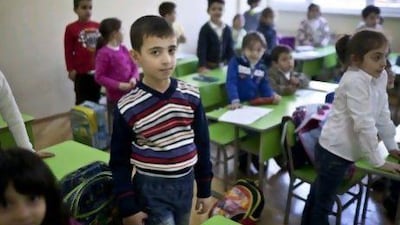YEREVAN // Hovig Asmaryan said he and his family were initially ashamed by their happiness when they finally caught sight of the Turkish flags flying on Syria's border with Turkey.
Syrian Armenians from Aleppo, they fled late in September in a nine-car convoy. For Mr Asmaryan and the others in the convoy, the flags signified they had escaped the nightmare their lives had become during the 20-month Syrian conflict.
But the sight also brought back memories of the what Armenians consider a genocide - the 1915 massacre of millions of Armenians by Ottoman Turks - that sent the previous generation fleeing for safety to Syria.
"I have grandfathers who were killed in that time. We looked to Turkey as an enemy who wanted to destroy us ... And suddenly I felt happy when I saw their flag," said Mr Asmaryan.
But Mr Asmaryan said he knew it was time to leave Syria, describing the violence and kidnappings in Aleppo "a gang fight". Through Turkey and then Georgia, they drove to Armenia, their homeland, seeking refuge.
Hranush Hakobyan, the head of Armenia's diaspora ministry, said about 6,000 Syrian-Armenian refugees have arrived in Armenia since the start of the 20-month-long conflict.
The Armenian government has been offering them visas upon arrival, recognising their Syrian driver licences, and expediting passports as part of a dual citizenship law. A public school in Yerevan is offering classes where Syrian-Armenian children can follow the Syrian curriculum.
There are resources for little else. Ms Hakobyan said the Armenian government has only a small amount of emergency housing and that it is already full with local Armenians and also some people from Iraq and Syria.
"People need help with jobs and rent," she said. "This is a big problem for my country."
The United Nations estimates that hundreds of thousands mostly impoverished Sunni refugees have fled Syria for neighbouring countries. As many as 1.5 million are internally displaced.
Syria's approximately 85,000-100,000 Armenian population is largely middle class, living mainly in Aleppo. Many left behind businesses, properties and, in some cases, significant savings in Syria's banks.
International sanctions and Syria's Central Bank policies make it difficult for them to transfer their money out of the country.
"Even in the baby's Pampers (nappies)," Mr Asmaryan said of how his young child aided in efforts to get some of his savings out of Syria.
Mr Asmaryan was one of the few Syrian Armenians interviewed by The National who agreed to be identified by his real name.
Though now out of Syria, others fear for their family members still living in the country and did not want to endanger their own ability to return one day.
"The [Syrian] Armenians here are scared of the [regime's] intelligence agencies," said a 23-year-old Syrian-Armenian man who arrived in Yerevan with his mother and father 14 weeks ago. The rebels were not the danger, he said.
Many of the refugees from Syria are staying with relatives who moved to Armenia before the conflict started. They have faced significant challenges. Armenia is an isolated and resource-scarce country. Syrian Armenians, most of whose ancestors are from eastern Turkey, speak a different dialect of Armenian. Those with means generally stay in the country only long enough to procure a visa to another country.
A 22-year-old former shop manager in Aleppo's Midan district, who identified himself as Jak Jakian, has been living at his uncle's house with his mother and 20-year-old brother in Yerevan's working-class Erebuni district for the past two months. He managed to find a factory job where he earns about US$200 (Dh735) a month.
"I still love my president. We were happy about our president," Mr Jakian said of Bashar Al Assad. He and his mother said they appreciated the economic subsidies provided by the Syrian regime for staples such as rice and sugar.
Other Syrian Armenians spoke of the churches and schools their community was freely allowed to maintain under the Al Assad regime.
Mr Jakian, and other Syrian Armenians interviewed, said they preferred the regime's rule and described coexisting peacefully with Syrians of other religions, blaming the conflict on a foreign conspiracy.
"There is a world war in Syria," Mr Jakian said. Echoing a line of the Al Assad regime, he added: "Terrorists came into Syria with guns and bombs."
Though nearly all expressed a desire to return to Syria, their doubts showed how the conflict has endangered Syria's multi-ethnic identity.
"Now I think, if there is a safe situation, I should go and sell everything and move here," said another Syrian-Armenian man. "Those with the financial means will come [to Armenia]."
Mr Asmaryan and his family were not planning to return to Syria. After staying in Yerevan for only five days, they were among a small group of Syrian Armenians who moved to Nagorno-Karabakh, a disputed area that borders Armenia, Azerbaijan and Iran. The primarily Armenian-populated region is the basis of a long-standing conflict between Armenia and Azerbaijan. The two countries fought a six-year war over it from 1988 to 1994.
Mr Asmaryan said he saw opportunities in Nagorno-Karabakh and planned to grow olive trees and buy agriculture equipment.
"It's safe," Mr Asmaryan said. "When we hear a boom we know it is a marriage and not a fight."

